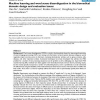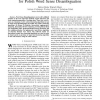65 search results - page 4 / 13 » Selective Sampling for Example-based Word Sense Disambiguati... |
136
click to vote
EMNLP
2007
15 years 3 months ago
2007
This paper presents a novel approach for exploiting the global context for the task of word sense disambiguation (WSD). This is done by using topic features constructed using the ...
129
click to vote
ACL
2003
15 years 3 months ago
2003
A central problem of word sense disambiguation (WSD) is the lack of manually sense-tagged data required for supervised learning. In this paper, we evaluate an approach to automati...
148
Voted
BMCBI
2006
15 years 2 months ago
2006
Background: Word sense disambiguation (WSD) is critical in the biomedical domain for improving the precision of natural language processing (NLP), text mining, and information ret...
153
Voted
IMCSIT
2010
14 years 11 months ago
2010
Word Sense Disambiguation in text is still a difficult problem as the best supervised methods require laborious and costly manual preparation of training data. Thus, this work focu...
115
click to vote
ACL
2004
15 years 3 months ago
2004
Supervised learning methods for WSD yield better performance than unsupervised methods. Yet the availability of clean training data for the former is still a severe challenge. In ...


